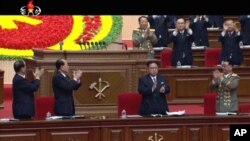Members of a U.S.-based task force are calling for Washington and its allies to change their approach to dealing with the North Korean nuclear threat, saying it is time to rethink the problem.
Mike Mullen, retired U.S. admiral and former chairman of the Joint Chiefs of Staff, along with former U.S. Senator Sam Nunn, who is now co-chairman of the Nuclear Threat Initiative organization, led a recent task force of regional security experts to develop a new strategy that would re-invigorate the peace process on the Korean Peninsula.
The task force, which was organized by the Council on Foreign Relations, recommended offering North Korea real incentives for agreeing to a moratorium on nuclear and missile tests, returning to international talks and reaffirming the goal of denuclearization that was agreed to in the 2005 joint statement, during Six-Party Talks held with North Korea, China, the U.S. South Korea, Russia and Japan.
These incentives include initial food aid and a possible reduction in U.S, South Korea joint military exercises while the talks are progressing.
North Korea has long demanded an end to these joint military drills, which they have called rehearsals for invasion.
And in exchange for a verifiable North Korean agreement to dismantle its nuclear weapons, a task force report recommends the U.S. and its allies offer a comprehensive peace treaty officially ending the Korean War (and possibly ending the U.S. military presence in Korea), as well as normalizing relations, lifting all sanctions and integration into the international financial system.
Magical thinking
There are dissenting views within the task force, including those who are skeptical that a peaceful negotiated outcome is possible with a North Korean government that has reneged on past nuclear deals.
Nicolas Eberstadt with the American Enterprise Institute said it verges on “magical thinking to imagine that the United States’ record of near total failure in nuclear diplomacy with North Korea over the past generation can somehow be dramatically changed absent a change of negotiating partners” in North Korea."
Senator Nunn said regime change could come as result of changes from within the Kim Jong Un government or in response to a North Korean attack, but it should not be the stated goal of the U.S. or its allies.
“That’s the last resort, but if that happens and we get to that point, (then) this strategy has failed,” said Nunn.
The United States and its allies in Northeast Asia are increasing their military capabilities to defend and deter against the growing North Korean nuclear threat.
They are also calling for increased sanctions and condemn the Kim Jong Un government for its continued repression of the North Korea people, the majority of whom live in poverty.
But they have stopped short of advocating for regime change.
“Throughout history, certainly regimes have changed, but regime change recently has not been working that well,” said Admiral Mullen.
Status quo
North Korea has responded defiantly to United Nations sanctions imposed in March, by accelerating nuclear and missile tests this year.
Military analysts say the North this year could produce enough fissile material at its uranium enrichment facilities to make about 20 nuclear bombs, and by the year 2020 it will most likely develop the reliable capability to arm an intercontinental ballistic missile with a miniaturized nuclear warhead.
Washington and Seoul are moving to deploy the Terminal High Altitude Area Defense (THAAD) anti-missile system on the Korean peninsula and have practiced military exercises that entail taking out key installations in North Korea.
The United Nations Security Council, which includes the U.S. and North Korea’s key allies, China and Russia, has condemned these repeated violations of U.N. resolutions banning the communist state’s nuclear program, and is considering further sanctions.
But China is reluctant to go along with implementing measures that would cause the Kim Jong Un government to collapse and lead to the U.S. and its ally South Korea to gain control of the entire Korean peninsula.
Youmi Kim in Seoul contributed to this report.

